| Srl | Item |
| 1 |
ID:
153602
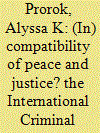

|
|
|
|
|
| Summary/Abstract |
Does the International Criminal Court's (ICC) pursuit of justice facilitate peace or prolong conflict? This paper addresses the “peace versus justice” debate by examining the ICC's impact on civil conflict termination. Active ICC involvement in a conflict increases the threat of punishment for rebel and state leaders, which, under certain conditions, generates incentives for these leaders to continue the conflict as a way to avoid capture, transfer to the Hague, and prosecution. The impact of ICC involvement is conditional upon the threat of domestic punishment that leaders face; as the risk of domestic punishment increases, the conflict-prolonging effects of ICC involvement diminish. I test these theoretical expectations on a data set of all civil conflict dyads from 2002 to 2013. Findings support the hypothesized relationship. Even after addressing potential selection and endogeneity concerns, I find that active involvement by the ICC significantly decreases the likelihood of conflict termination when the threat of domestic punishment is relatively low.
|
|
|
|
|
|
|
|
|
|
|
|
|
|
|
|
| 2 |
ID:
153603
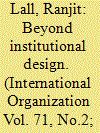

|
|
|
|
|
| Summary/Abstract |
International organizations (IOs) have long been a central focus of scholarship in international relations, yet we know remarkably little about their performance. This article offers an explanation for differences in the performance of IOs and tests it using the first quantitative data set on the topic. I argue that the primary obstacle to effective institutional performance is not deviant behavior by IO officials—as conventional “rogue-agency” analyses suggest—but the propensity of states to use IOs to promote narrow national interests rather than broader organizational objectives. IOs that enjoy policy autonomy vis-à-vis states will thus exhibit higher levels of performance. However, in the international context policy autonomy cannot be guaranteed by institutional design. Instead, it is a function of (1) the existence of (certain types of) institutionalized alliances between IOs and actors above and below the state; and (2) the technical complexity of IO activities. I provide empirical evidence for the argument by constructing and analyzing a cross-sectional data set on IO performance—based in part on a new wave of official government evaluations of IOs and in part on an original survey of IO staff—and conducting a comparative case study in the realm of global food security.
|
|
|
|
|
|
|
|
|
|
|
|
|
|
|
|
| 3 |
ID:
153604
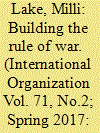

|
|
|
|
|
| Summary/Abstract |
Why have peace-building and reconstruction efforts so frequently failed to create durable institutions that can deter or withstand resurgent violence in volatile sites of cyclical conflict? Extant theory predicts that new institutions can help overcome violence and mitigate commitment problems in postconflict contexts by reducing uncertainty in inherently uncertain environments. By contrast, this article argues that postconflict institutions often prove limited in their abilities to contribute to durable peace because they offer wartime elites new venues in which to pursue conflict-era agendas. Through a micro-analysis of efforts to build the rule of law in eastern Democratic Republic of Congo, I demonstrate that wartime elites capture and instrumentalize new legal institutions to maximize their intra- and inter-organizational survival; to pursue economic, military, and political agendas behind the scenes; and, in some cases, to prepare for an imminent return to war.
|
|
|
|
|
|
|
|
|
|
|
|
|
|
|
|
| 4 |
ID:
153607


|
|
|
|
|
| Summary/Abstract |
While increasing trade and foreign direct investment, international trade agreements create winners and losers. Our paper examines the distributional consequences of preferential trade agreements (PTAs) at the firm level. We contend that PTAs expand trade among the largest and most productive multinationals by lowering preferential tariffs. We examine data covering the near universe of US foreign direct investment and disaggregated tariff data from PTAs signed by the United States. Our results indicate that US preferential tariffs increase sales to the United States from the most competitive subsidiaries of multinational corporations operating in partner countries. We also find increases in market concentration in partner countries following preferential liberalization with the United States. By demonstrating that the gains from preferential liberalization are unevenly distributed across firms, we shed new light on the firm-level, economic sources of political mobilization over international trade and investment policies.
|
|
|
|
|
|
|
|
|
|
|
|
|
|
|
|
| 5 |
ID:
153608
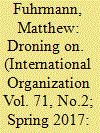

|
|
|
|
|
| Summary/Abstract |
Unmanned Aerial Vehicles (UAVs), more popularly known as “drones,” have become emblematic of twenty-first century military technologies but scholars have yet to convincingly explain the drivers of UAV proliferation. Using the first systematic data set of UAV proliferation, this research note examines the spread of UAVs in the context of scholarly debates about interests versus capacity in explaining policy adoption. The results yield important insights for both IR scholarship and the policy-making community. While countries that experience security threats—including territorial disputes and terrorism—are more likely to seek UAVs, drone proliferation is not simply a function of the threat environment. We find evidence that democracies and autocracies are more likely than mixed regimes to develop armed UAV programs, and suggest that autocracies and democracies have their own unique incentives to acquire this technology. Moreover, supply-side factors play a role in the UAV proliferation process: a state's technological capacity is a strong predictor of whether it will obtain the most sophisticated UAVs. The theories and evidence we present challenge emerging views about UAV proliferation and shed useful light on how and why drones spread.
|
|
|
|
|
|
|
|
|
|
|
|
|
|
|
|
| 6 |
ID:
153605
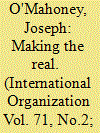

|
|
|
|
|
| Summary/Abstract |
Do normative arguments change what political actors do and if so, how? Rather than using the pure force of abstract moral reasoning, states often try to move the locus of contestation to an arena where they can make practical progress—the evidence or the empirical facts in support of their argument. This paper analyzes how states try to bolster their position first by constructing an argument in which an action represents part of their argument and then by performing that action to make the argument seem more convincing. I call this mechanism rhetorical adduction. The paper challenges theories of communication that deny a causal role to the content of normative arguments and diverges from a leading view on argumentation that arguments have their effects through persuasion. Integrating strategic argumentation theory with theory from psychology about how people make choices based on compelling reasons rather than cost-benefit analysis, I also use theory from sociology on how people resolve morally complex situations through the performance of “reality tests.” I illustrate the mechanism using a case from the Indo-Pakistani war of 1971 when initial resistance to recognizing the putative state of Bangladesh after India's invasion of East Pakistan was reversed as a result of an argument that Indian troop withdrawal meant that international norms were not violated.
|
|
|
|
|
|
|
|
|
|
|
|
|
|
|
|
| 7 |
ID:
153606
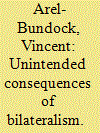

|
|
|
|
|
| Summary/Abstract |
The international tax system is a complex regime composed of thousands of bilateral tax treaties. These agreements coordinate policies between countries to avoid double taxation and encourage international investment. I argue that by solving this coordination problem on a bilateral basis, states have inadvertently created opportunities for treaty shopping by multinationals. These opportunities, in turn, reduce the potency of fiscal policy, put pressure on governments to change their domestic tax laws, and ultimately constrain state autonomy. This constraint is theoretically distinct from the usual race-to-the-bottom story and it generates different testable implications. I use a motivating case study to show how multinationals leverage the structure of the treaty network to reduce their tax burden. Then, I develop a new measure of treaty-shopping opportunities for firms in 164 countries. Where the proliferation of tax treaties allows multinationals to engage in treaty shopping, states’ fiscal autonomy is limited, and governments tend to maintain lower tax rates.
|
|
|
|
|
|
|
|
|
|
|
|
|
|
|
|